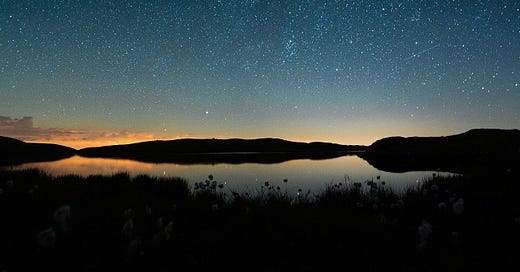A TEDx Talk Exploring the Panzoic Effect
Bernadette Mary Dineen explores how the search for extraterrestrial life is about more than just discovery
The Panzoic Effect, the term that I developed along with Mike Toillion and then shared during my talk for TEDxBoulder this past September and at the XPANSE meeting in Abu Dhabi in November, is a suggestion—a hypothesis, if you will—that the sheer act of considering the potential for life to be “out there” might also impact how we see ourselves and how we treat each other.
Experiences of wonder and awe can drive us to be more aware of our own actions, to be more thoughtful in how we see ourselves as members of our communities and biosphere, to act in prosocial manners, and can inspire us to be the better versions of ourselves we know we can be.
Certainly there is something tremendously wonderful and awe inspiring in considering our place and in the cosmos and thinking about what or who else might be out there. Astrobiology as a realm of study not only allows us to think about the possibilities but inspires us to explore our own place within it all, as individuals and collectively as a biosphere—which is why I often refer to astrobiology as being luminous with regard to human awareness.
Much as with many developments in human thinking—from the creation of similar star stories shared among ancient people to how Sir Isaac Newton and Gottfried Leibniz created calculus independently and at roughly the same time—it shouldn’t at all be surprising that others are also thinking about the ways that exploring in realms like space exploration, astronomy, Origins of Life, and astrobiology might also impact us as humans. Indeed, such considerations have been part of the philosophy of astronomy and astrobiology for quite some time. As Carl Sagan considered the Pale Blue Dot image in 1994, he shared:
“It has been said that astronomy is a humbling and character-building experience. There is perhaps no better demonstration of the folly of human conceits than this distant image of our tiny world. To me, it underscores our responsibility to deal more kindly with one another, and to preserve and cherish the pale blue dot, the only home we've ever known.”
This past week, a fantastic TEDx talk video was shared on the Slack workspace for the Network for Life Detection (NfoLD). In the video, recorded at TEDxTufts, Bernadette Mary Dineen explores how the search for extraterrestrial life is about more than just discovery—it's a journey to understand ourselves on a deeper level. Exploration reshapes how we see ourselves, potentially revealing more about humanity than the life we may find.
Bernadette is a doctoral student in Tufts University's Department of Chemistry, where she researches the effects of UV radiation and oxychlorine intermediates on biological compounds under Mars-like conditions, contributing to the search for life. She has collaborated with NASA’s Mars Mission Concept Workshop and develops astrochemistry-focused educational curricula. And, as you can tell from the video, she’s thinking about the ways that astrobiology can impact us as individuals and collectively. She wants others to think about the ways in which looking out at the stars and other worlds like Mars and thinking about life out there might also be a way of “looking in” toward ourselves.
The Panzoic Effect at work!



